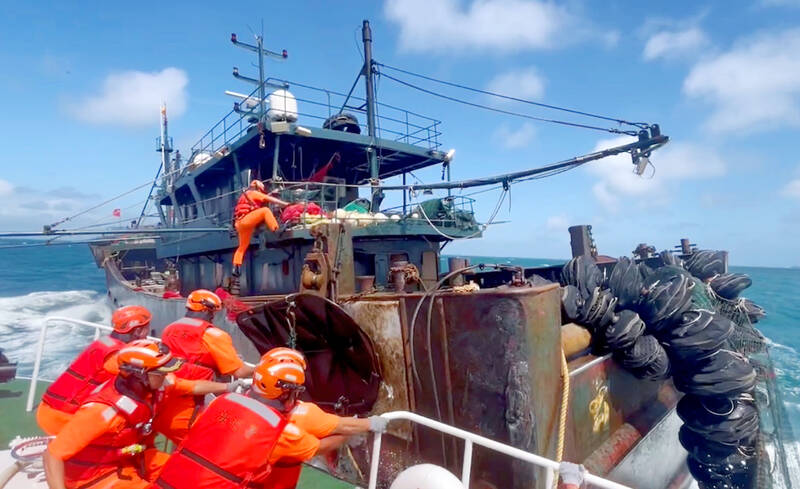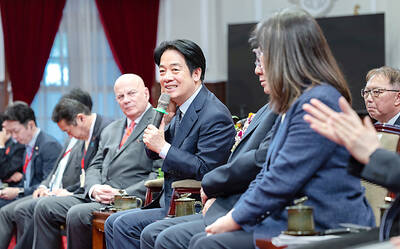Funds frozen by the Legislative Yuan might mean that the Ocean Affairs Council (OAC) cannot take delivery of two coast guard ships, harming its credibility with contractors for future purchases, OAC Minister Kuan Bi-ling (管碧玲) said in an interview yesterday.
Even though the OAC’s fiscal 2025 funding is greater than the previous year — despite the Legislative Yuan freezing or cutting NT$1 billion (US$30.54 million) for it and its subsidiary agencies — the cuts would still affect many of its medium and long-term projects, as they require higher payments in the later stages, Kuan said.
The increase in funding indicates that projects are due, but with the cuts, the OAC would be unable to make payments, she said.

Photo courtesy of the Ocean Affairs Council
For example, payments for the two patrol vessels — which are completed — would not be made because of the budget cuts, she said, adding that it would have to wait until next year to collect the ships.
The budget cuts would undermine national security, as the Coast Guard Administration (CGA) would not have enough ships to deal with threats posed by China Coast Guard vessels and “gray zone” tactics, including possible attempts to sever undersea cables near Taiwan, she said.
Foreign research and reports show that the line between what ships are Chinese research vessels and what are part of the Chinese People’s Liberation Army Navy fleet has blurred, Kuan said, adding that the OAC believed the so-called research vessels are not purely for research, but also play a role in China’s grand strategy, as undersea geography and topography, as well as hydrographic surveys, are strategic information.
The CGA would deploy its own vessels to chase Chinese research ships out of Taiwanese waters if incursions occur, Kuan said.
However, the budget issues must be resolved, either through inter-caucus discussions at the legislature or by the Executive Yuan authorizing additional funds, she said.
Budget freezes are typically used to bring agencies to the legislature to explain their funding proposals, but the actions this year would underfund agencies, she said.
The OAC plans to contract ship builders this year, but they would have to determine whether they want to take the risk, as the council would have only 70 percent of its funding, she said.

Two US House of Representatives committees yesterday condemned China’s attempt to orchestrate a crash involving Vice President Hsiao Bi-khim’s (蕭美琴) car when she visited the Czech Republic last year as vice president-elect. Czech local media in March last year reported that a Chinese diplomat had run a red light while following Hsiao’s car from the airport, and Czech intelligence last week told local media that Chinese diplomats and agents had also planned to stage a demonstrative car collision. Hsiao on Saturday shared a Reuters news report on the incident through her account on social media platform X and wrote: “I

STILL ON THE TABLE: The government is not precluding advanced nuclear power generation if it is proven safer and the nuclear waste issue is solved, the premier said Taiwan is willing to be in step with the world by considering new methods of nuclear energy generation and to discuss alternative approaches to provide more stable power generation and help support industries, Premier Cho Jung-tai (卓榮泰) said yesterday. The government would continue to develop diverse and green energy solutions, which include considering advances in nuclear energy generation, he added. Cho’s remarks echoed President William Lai’s (賴清德) comments in an interview last month, saying the government is not precluding “advanced and newer nuclear power generation” if it is proven to be safer and the issue of nuclear waste is resolved. Lai’s comment had

‘BUILDING PARTNERSHIPS’: The US military’s aim is to continue to make any potential Chinese invasion more difficult than it already is, US General Ronald Clark said The likelihood of China invading Taiwan without contest is “very, very small” because the Taiwan Strait is under constant surveillance by multiple countries, a US general has said. General Ronald Clark, commanding officer of US Army Pacific (USARPAC), the US Army’s largest service component command, made the remarks during a dialogue hosted on Friday by Washington-based think tank the Center for Strategic and International Studies. Asked by the event host what the Chinese military has learned from its US counterpart over the years, Clark said that the first lesson is that the skill and will of US service members are “unmatched.” The second

STANDING TOGETHER: Amid China’s increasingly aggressive activities, nations must join forces in detecting and dealing with incursions, a Taiwanese official said Two senior Philippine officials and one former official yesterday attended the Taiwan International Ocean Forum in Taipei, the first high-level visit since the Philippines in April lifted a ban on such travel to Taiwan. The Ocean Affairs Council hosted the two-day event at the National Taiwan University Hospital International Convention Center. Philippine Navy spokesman Rear Admiral Roy Vincent Trinidad, Coast Guard spokesman Grand Commodore Jay Tarriela and former Philippine Presidential Communications Office assistant secretary Michel del Rosario participated in the forum. More than 100 officials, experts and entrepreneurs from 15 nations participated in the forum, which included discussions on countering China’s hybrid warfare